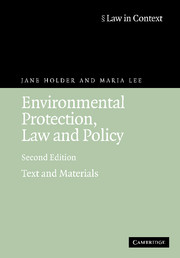Book contents
- Frontmatter
- Contents
- Table of EU legislation
- Table of international conventions
- Table of legislation
- Table of cases
- Acknowledgements
- Preface
- Part I Introduction: Law in Context
- Part II The EU Context
- Part III The International Context
- Part IV Mechanisms of Regulation I: Pollution Control
- 8 The institutional architecture of pollution control
- 9 Licensing as a regulatory technique: the example of integrated pollution prevention and control
- 10 Enforcement and implementation of direct regulation
- 11 Regulatory techniques: beyond licensing
- Part V Mechanisms of Regulation II: Controls Over Land Use and Development
- Index
8 - The institutional architecture of pollution control
Published online by Cambridge University Press: 05 June 2012
- Frontmatter
- Contents
- Table of EU legislation
- Table of international conventions
- Table of legislation
- Table of cases
- Acknowledgements
- Preface
- Part I Introduction: Law in Context
- Part II The EU Context
- Part III The International Context
- Part IV Mechanisms of Regulation I: Pollution Control
- 8 The institutional architecture of pollution control
- 9 Licensing as a regulatory technique: the example of integrated pollution prevention and control
- 10 Enforcement and implementation of direct regulation
- 11 Regulatory techniques: beyond licensing
- Part V Mechanisms of Regulation II: Controls Over Land Use and Development
- Index
Summary
Introduction
Pollution has long been a concern of government, property owners and citizens, and law has been laid down in response for centuries. But Britain was the first country to industrialise, and, by the mid nineteenth century, the effects of pollution were no longer limited by the scale of polluting activities and the size of cities. Cities began to swell, London becoming ‘the murky, modern Babylon’, Manchester ‘a Babel built of brick’, its warehouses ‘Babylonian monuments’. In the next section of this chapter we outline the development of a legal response to polluting activities in the nineteenth century.
If the nineteenth century can be usefully identified as marking the beginning of a focussed response to pollution control, the late 1960s are generally identified as the beginning of a focussed and conscious environmental awareness, moving (at least in principle) beyond the Victorian concern with private property and public health. The modern era of environmental law is usually dated from the early 1970s. ‘Environmental’ law, however, is part of a slow historical process, not a sudden development. The early measures of pollution control reflected the ad hoc nature of the public pressures that stimulated their development, which were primarily focussed on the protection of property and public health. Towards the end of the 1960s, a more self-consciously and recognisably ‘environmental’ awareness developed among the public, and that demanded a more focussed government response.
Information
- Type
- Chapter
- Information
- Environmental Protection, Law and PolicyText and Materials, pp. 323 - 351Publisher: Cambridge University PressPrint publication year: 2007
